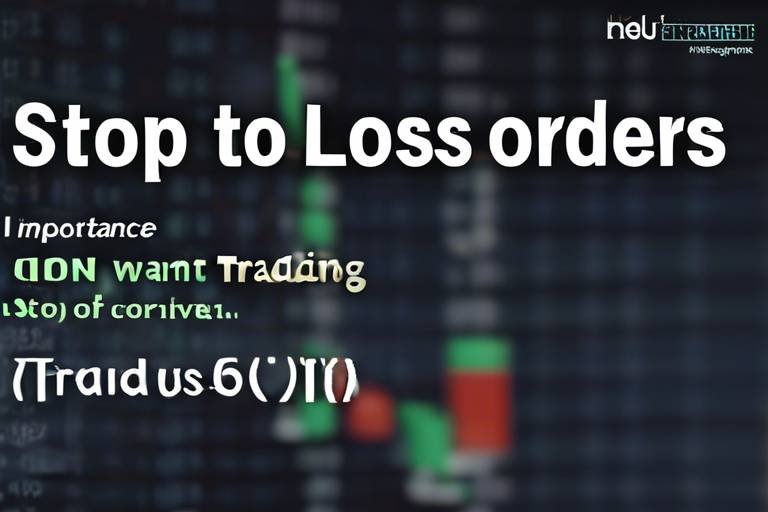Using News Events to Your Trading Advantage
In the fast-paced world of trading, staying ahead of the game requires more than just a solid understanding of charts and technical indicators. It demands a keen awareness of the news events that shape the financial landscape. Imagine being a trader who not only reacts to market movements but anticipates them—this is the power of leveraging news events to your advantage. By understanding how current events influence market behavior, you can make informed decisions that can lead to better trading outcomes.
News events can be likened to the winds that fill the sails of a ship; they can propel you forward or knock you off course. The key lies in knowing which way the wind is blowing. When significant news breaks, such as a major economic report or a geopolitical crisis, the markets often react dramatically. This reaction can create opportunities for traders who are prepared to act swiftly and strategically. But how do you become that trader who capitalizes on these moments rather than merely reacting?
First, it’s essential to grasp the concept of market reactions. Traders must be able to interpret the immediate impact of news on asset prices. This involves not just understanding the news itself but also gauging how other market participants are likely to respond. For instance, if unemployment rates drop unexpectedly, traders might anticipate a bullish trend in the stock market. However, it’s crucial to remember that the initial reaction may not always reflect the long-term implications of the news.
As we delve deeper into the types of news events that can influence trading strategies, you’ll discover that they fall into several categories. Economic reports, geopolitical developments, and corporate announcements each play a unique role. Recognizing these categories is vital for developing a comprehensive trading strategy. For example, economic indicators like GDP growth or inflation rates can provide insights into the overall health of the economy, while geopolitical events can lead to sudden shifts in market sentiment.
In the following sections, we will explore how to analyze these news events effectively, interpret economic reports, and develop a robust news trading strategy. Whether you are a seasoned trader or just starting, understanding how to leverage news events can give you a significant edge in the market.
- How can I stay updated on news events that affect the markets?
Utilizing financial news platforms, subscribing to economic calendars, and following market analysts on social media can help you stay informed.
- What are the risks of trading based on news events?
News trading can be volatile; prices can swing dramatically in response to unexpected news. It's crucial to have a risk management strategy in place.
- Can I trade news events without prior experience?
While it's possible, gaining a solid foundation in trading principles and understanding how to analyze news is highly recommended.

Understanding Market Reactions
Market reactions to news events can often feel like a wild roller coaster ride, with prices soaring one moment and plummeting the next. Understanding these reactions is vital for traders who want to not just survive but thrive in the tumultuous world of trading. When news breaks, it’s not just about the information itself; it’s about how that information is perceived by the market. Traders need to interpret these reactions to capitalize on market movements effectively.
Imagine the market as a living organism, responding to stimuli in real-time. When a significant news event occurs, such as a sudden change in government policy or an unexpected economic report, traders react almost instinctively. This reaction can lead to rapid buying or selling, creating opportunities for those who can read the signs. For instance, if a positive jobs report is released, traders might rush to buy stocks, anticipating that the economy is on the upswing. Conversely, a negative report could trigger panic selling, causing prices to drop sharply.
To make the most of these market reactions, traders often rely on a combination of instinct and analysis. They look at the context of the news, considering not just the headline but also the underlying factors that could influence market sentiment. This involves asking questions like: What does this news mean for the overall economy? How might it affect different sectors? Are there historical precedents that can guide my decisions?
Moreover, the timing of news releases plays a crucial role in how markets react. For example, news released during trading hours can lead to immediate volatility, while after-hours announcements may result in a delayed reaction as traders digest the information overnight. Therefore, keeping an eye on the calendar of economic events can be a game-changer for traders looking to position themselves advantageously.
Additionally, traders often categorize news events into two types: scheduled and unscheduled. Scheduled events, like quarterly earnings reports or economic indicators, are anticipated and can be planned for. On the other hand, unscheduled news, such as geopolitical tensions or natural disasters, can catch traders off guard. Understanding the nature of these events and their potential impact on market sentiment is vital for developing a successful trading strategy.
In summary, understanding market reactions to news events is not just about knowing what happened; it's about understanding the why behind those movements. By interpreting news through the lens of market psychology and historical context, traders can position themselves to take advantage of opportunities as they arise. It’s all about being proactive rather than reactive, ensuring that your trading strategy is as dynamic as the market itself.

Types of News Events
When it comes to trading, not all news is created equal. Different types of news events can have varying impacts on the markets, and understanding these nuances is crucial for any trader looking to gain an edge. Think of the financial market as a vast ocean, where the tides can shift dramatically based on the winds of news. Some events can create gentle ripples, while others can unleash a storm, leading to significant price movements. In this section, we will categorize the main types of news events and explore how they can influence your trading strategies.
At the core, news events can be classified into three primary categories: economic reports, geopolitical developments, and corporate announcements. Each of these categories plays a vital role in shaping market sentiment and can lead to opportunities for savvy traders. Let’s dive deeper into each category and see how they can impact trading strategies.
Economic reports are like the pulse of a nation’s financial health. They provide critical insights into the economy's performance and can cause swift market reactions. Key indicators such as Gross Domestic Product (GDP), unemployment rates, and inflation figures are closely monitored by traders. For instance, a higher-than-expected GDP growth can signal a booming economy, prompting traders to buy assets associated with that economy. Conversely, poor unemployment figures might lead to a sell-off as traders anticipate lower consumer spending.
To better understand how these reports influence trading, let’s look at a table summarizing some of the most impactful economic indicators:
| Indicator | Description | Market Impact |
|---|---|---|
| GDP | Measures the total economic output of a country. | Positive GDP growth often leads to bullish market sentiment. |
| Unemployment Rate | Percentage of the labor force that is unemployed. | High unemployment can lead to market downturns as consumer spending decreases. |
| Inflation Rate | Measures the rate at which the general level of prices for goods and services rises. | High inflation may prompt central banks to raise interest rates, affecting asset prices. |
Understanding these indicators allows traders to position themselves strategically before and after the reports are released. The key is to stay ahead of the curve and anticipate market reactions.
Next up, we have geopolitical events, which can be as unpredictable as the weather. These events include anything from political elections, international conflicts, to trade negotiations. The impact of geopolitical news can be profound, often leading to increased volatility in the markets. For instance, a sudden political upheaval in a major oil-producing country can cause oil prices to skyrocket, affecting not just the energy sector but also related industries.
Traders must keep a close eye on global news and understand how political events may influence market sentiment. For example, if a country announces new tariffs on imports, it can lead to a ripple effect across various sectors, creating both risks and opportunities. Being aware of these developments can give traders a competitive edge, allowing them to react swiftly to changing market conditions.
Finally, we have corporate announcements, which can significantly impact individual stocks and sectors. Earnings reports, product launches, and mergers and acquisitions are just a few examples of corporate news that traders should watch out for. A strong earnings report can lead to a surge in a company’s stock price, while disappointing results can have the opposite effect.
In summary, understanding the types of news events and their potential impacts is essential for any trader looking to enhance their trading strategy. By staying informed and interpreting these events effectively, traders can capitalize on market movements and make more informed decisions.
- What types of news events should traders pay attention to? Traders should focus on economic reports, geopolitical developments, and corporate announcements.
- How can economic indicators affect trading strategies? Economic indicators provide insights into market trends, allowing traders to anticipate price movements and make informed decisions.
- What is the best way to stay informed about news events? Traders can use financial news websites, economic calendars, and social media to stay updated on the latest news events.

Economic Indicators
When it comes to trading, understanding is like having a secret map that leads you to treasure. These indicators, which include metrics like GDP, unemployment rates, and inflation figures, serve as vital signs of a country's economic health. They can provide traders with insights that are crucial for making informed decisions. Imagine trying to navigate through a dense forest without a compass; that’s what trading without understanding these indicators feels like. By keeping an eye on these economic signals, traders can better predict market movements and position themselves advantageously.
For instance, the Gross Domestic Product (GDP) is a key indicator that reflects the total value of all goods and services produced in a country. A rising GDP often signals a healthy economy, which can lead to increased investor confidence and higher asset prices. Conversely, a declining GDP might raise red flags, prompting traders to reconsider their positions. Similarly, the unemployment rate provides insights into labor market conditions. A high unemployment rate can indicate economic distress, while a low rate often suggests a robust job market, which can drive consumer spending and, consequently, market growth.
Inflation figures, on the other hand, highlight the rate at which prices for goods and services rise. While a moderate level of inflation is often seen as a sign of a growing economy, runaway inflation can lead to uncertainty and market volatility. Traders who can accurately interpret these indicators can anticipate market reactions and make timely trades. For example, if inflation rises unexpectedly, traders might rush to buy assets that typically perform well during inflationary periods, such as commodities or real estate.
To effectively analyze these indicators, traders should consider the following aspects:
- Trends: Look for patterns over time rather than focusing on a single report.
- Expectations: Compare actual results to market expectations to gauge the potential impact on asset prices.
- Context: Understand the broader economic environment to interpret indicators accurately.
By developing a keen sense for these economic indicators, traders can not only enhance their strategies but also gain the confidence to navigate the often-turbulent waters of the financial markets. It’s about connecting the dots and seeing the bigger picture. Just like a detective piecing together clues, traders can use economic indicators to unlock the mysteries of market movements, making informed decisions that lead to better trading outcomes.

Interpreting Economic Reports
Interpreting economic reports is like deciphering a treasure map; it requires a keen eye and a bit of intuition. These reports are packed with data that can either illuminate the path to profitable trades or lead you into a fog of uncertainty. For traders, understanding the nuances of these documents is crucial. They provide insights into the health of the economy, which can significantly impact market movements. So, how do you make sense of all this information?
Firstly, it’s important to recognize the key components of economic reports. Typically, these reports include metrics such as Gross Domestic Product (GDP), unemployment rates, inflation figures, and consumer confidence indexes. Each of these elements tells a different story about the economic landscape. For instance, a rising GDP indicates a growing economy, which can lead to bullish market sentiment, while increasing unemployment may suggest economic distress, prompting bearish reactions.
To effectively interpret these reports, traders should focus on the following aspects:
- Context: Understanding the broader economic context is essential. For example, if unemployment rates drop but inflation rises, it could signal a tightening labor market, which might lead to interest rate hikes.
- Comparative Analysis: Look at historical data to see how current figures stack up. Are they better or worse than previous months? This comparison can provide valuable insights into trends.
- Market Expectations: Pay attention to what the market was anticipating. If a report surprises traders—whether positively or negatively—it can lead to sharp price movements.
Additionally, it’s vital to consider the timing of these reports. Economic data is often released on a schedule, and being aware of these timelines can give traders an advantage. For example, if you know that a crucial jobs report is coming out on Friday, you might want to adjust your trading strategy accordingly. Will you hold your positions, or will you take a more cautious approach as the date approaches?
Moreover, the language used in these reports can also provide clues about future economic conditions. Words like "robust" or "sluggish" can signal the overall sentiment of the economy. For instance, if a central bank describes the economy as "robust," it may indicate a likelihood of interest rate hikes, which can affect currency values. Understanding these subtleties can help traders make more informed decisions.
In conclusion, interpreting economic reports is not just about crunching numbers; it’s about understanding the story behind those numbers. By focusing on context, comparative analysis, market expectations, timing, and language, traders can enhance their ability to make informed decisions. This skill can be the difference between a successful trade and a costly mistake.
- What are economic reports? Economic reports are official documents that provide data on various economic indicators, such as GDP, unemployment rates, and inflation.
- Why are economic reports important for traders? They help traders understand the economic environment, which can influence market movements and trading strategies.
- How can I stay updated on economic reports? Traders can stay informed by following financial news websites, subscribing to economic calendars, and using trading platforms that offer real-time updates.

Impact on Currency Markets
The relationship between economic indicators and currency fluctuations is a fascinating dance that traders must master. When significant economic news is released, it can send shockwaves through the currency markets, leading to rapid price movements. For instance, when a country reports a higher-than-expected GDP growth rate, its currency often appreciates against others. This is because stronger economic performance typically signals a robust market, attracting foreign investment and increasing demand for that currency.
Conversely, negative news can have the opposite effect. For example, if unemployment rates surge unexpectedly, investors may lose confidence in the economy, leading to a depreciation of the national currency. This volatility presents both risks and opportunities for traders. Understanding how to interpret these economic indicators is crucial for making informed trading decisions.
To illustrate this further, consider the following table that outlines some key economic indicators and their typical impacts on currency values:
| Economic Indicator | Typical Impact on Currency |
|---|---|
| GDP Growth Rate | Currency appreciation |
| Unemployment Rate | Currency depreciation |
| Inflation Rate | Volatility, potential for currency strength or weakness |
| Interest Rate Decisions | Currency appreciation if rates rise; depreciation if rates fall |
Traders often use a variety of strategies to navigate these currency fluctuations. One popular approach is to employ a news trading strategy where they place trades immediately before or after significant news announcements. However, this requires a deep understanding of the market's potential reactions and the ability to act quickly. Timing is everything, and the difference of just a few seconds can determine whether a trade is profitable or results in a loss.
Moreover, keeping an eye on global economic trends is essential. Currency markets do not operate in isolation; they are influenced by a complex web of international relations and economic conditions. For instance, geopolitical tensions can lead to safe-haven currencies like the US Dollar or Swiss Franc gaining strength as investors flock to perceived stability. Understanding these dynamics can give traders a significant edge.
In summary, the impact of economic indicators on currency markets is profound and multifaceted. By staying informed and developing a keen sense of how these indicators affect currency values, traders can better position themselves to capitalize on market movements. The key lies in continuous learning and adaptation to the ever-changing landscape of global finance.
- What are the main economic indicators that affect currency markets?
Key indicators include GDP growth rate, unemployment rate, inflation rate, and interest rate decisions. - How quickly do currency markets react to news events?
Currency markets can react almost instantaneously to news, making timing critical for traders. - Can geopolitical events impact currency values?
Yes, geopolitical events can lead to significant volatility, often strengthening safe-haven currencies. - What strategies can traders use to profit from news events?
Traders can employ news trading strategies, technical analysis, and risk management techniques to navigate market movements.

Geopolitical Events
Geopolitical events are like the wildcards of the trading world—unpredictable, yet immensely powerful. They can send shockwaves through the markets, creating volatility that savvy traders can exploit. Have you ever noticed how a single tweet from a world leader can affect the price of oil or gold? That’s the essence of geopolitical trading. It's essential to understand that these events can range from military conflicts and diplomatic agreements to elections and trade negotiations. Each of these events carries the potential to influence market sentiment and shift asset prices dramatically.
When we talk about geopolitical events, we must consider the magnitude and timing of these occurrences. For instance, a sudden military conflict might cause immediate panic, leading to a sell-off in stocks and a flight to safety in assets like gold or government bonds. On the other hand, a peace treaty could spur a bullish trend in the markets, as investors gain confidence in stability and growth. The key for traders is to stay one step ahead and anticipate these movements.
But how can traders effectively anticipate and react to these geopolitical shifts? Here's where research and analysis come into play. Monitoring the news, following expert analyses, and understanding historical precedents can provide invaluable insights. For example, if a country is known for its oil production and there’s a political uprising, it’s likely that the price of oil will be affected. Keeping an eye on such developments allows traders to position themselves strategically before the market reacts.
Furthermore, understanding the interconnectedness of global markets is crucial. A crisis in one part of the world can have ripple effects across continents. For instance, tensions in the Middle East often lead to fluctuations in energy prices globally. Therefore, traders should not only focus on local news but also pay attention to international developments. This broader perspective can help in making informed trading decisions that capitalize on market volatility.
To wrap it up, navigating the complexities of geopolitical events requires a mix of vigilance, analysis, and strategy. By staying informed and flexible, traders can turn potential market chaos into profitable opportunities. Remember, in the world of trading, knowledge is power, and being prepared can make all the difference when the next geopolitical event unfolds.
- What are geopolitical events? Geopolitical events encompass political developments, conflicts, and international relations that can impact financial markets.
- How do geopolitical events affect trading? They can create volatility and influence asset prices, providing both risks and opportunities for traders.
- What should traders do during geopolitical crises? Traders should stay informed, analyze the situation, and be prepared to adjust their strategies accordingly.
- Where can I find reliable news on geopolitical events? Trusted news outlets, financial news websites, and economic analysis platforms are great sources.

Developing a News Trading Strategy
Creating a robust news trading strategy is essential for success in the fast-paced world of trading. When you think about it, trading on news events is like surfing; you need to catch the right wave at the right time to ride it successfully. But how do you ensure you’re not just paddling aimlessly? Well, it all starts with a solid strategy that incorporates various elements to help you navigate the turbulent waters of market volatility.
First and foremost, you need to have a clear understanding of the types of news events that can impact the markets. This includes everything from economic reports and geopolitical developments to corporate earnings announcements. By categorizing these events and understanding their potential impacts, you can better position yourself to capitalize on market movements. For instance, economic indicators often provide a glimpse into the health of an economy, while geopolitical events can create sudden shifts in market sentiment. Knowing when these events are scheduled can give you a significant advantage.
Another critical component of your news trading strategy should be risk management. Think of risk management as your safety net; it’s what keeps you from falling too hard when the market takes a tumble. Effective risk management techniques might include setting stop-loss orders, diversifying your portfolio, and determining your risk tolerance before entering a trade. By having a plan in place, you can mitigate potential losses and protect your capital. For example, if you’re trading on an economic report, consider how much you’re willing to lose if the market moves against you. This kind of preparation can save you from emotional decision-making in the heat of the moment.
Additionally, staying informed is vital in developing your news trading strategy. In today’s digital age, information is at our fingertips, but it’s crucial to rely on reliable sources. Follow trusted financial news outlets, subscribe to economic calendars, and consider using trading platforms that offer real-time news updates. This will help you make timely decisions based on the latest developments. Remember, the market doesn’t wait for anyone. If you’re not in the loop, you could miss out on significant trading opportunities.
Finally, practice makes perfect. Before diving headfirst into news trading, consider using a demo account to test your strategy. This allows you to experiment with different approaches without risking real money. By analyzing your results, you can refine your strategy over time. Just like a seasoned surfer knows how to read the waves, you’ll learn to anticipate market reactions to news events, giving you a greater edge in your trading endeavors.
In summary, developing a news trading strategy involves understanding the types of news events that can impact the markets, implementing effective risk management techniques, staying informed through reliable sources, and practicing your strategy in a simulated environment. By combining these elements, you can create a comprehensive approach that not only enhances your trading performance but also boosts your confidence in navigating the dynamic world of trading.
- What is news trading? News trading involves making trading decisions based on news events and economic data releases that can affect market prices.
- How can I stay updated on news events? You can stay updated by following financial news websites, subscribing to economic calendars, and using trading platforms that provide real-time news alerts.
- What are some effective risk management techniques? Some effective techniques include setting stop-loss orders, diversifying your portfolio, and assessing your risk tolerance before trading.
- Should I use a demo account for news trading? Yes, using a demo account allows you to practice your news trading strategy without risking real money, helping you refine your approach.

Risk Management Techniques
When it comes to trading on news events, effective risk management is not just a good practice; it's a necessity. The markets can be unpredictable, and the volatility that often follows significant news can lead to both opportunities and losses. So, how can traders protect themselves while capitalizing on these market movements? Let's dive into some essential techniques that can help mitigate risks and enhance trading success.
One of the most critical aspects of risk management is setting a stop-loss order. This is a predetermined price at which a trader will exit a losing position to prevent further losses. Imagine you're on a roller coaster; once you hit the peak, you want to secure your seatbelt tightly. Similarly, a stop-loss acts as your safety harness, ensuring you don’t fall into a pit of despair when the market takes a nosedive.
Another technique involves diversifying your portfolio. Just like you wouldn't put all your eggs in one basket, trading different assets can help spread risk. By investing across various sectors or asset classes, you can cushion the impact if one particular investment doesn’t perform as expected. For instance, if your stocks plummet due to a negative earnings report, your bonds or commodities might still hold steady, balancing your overall portfolio performance.
Additionally, keeping a close eye on your position size is vital. This refers to the amount of capital you allocate to a particular trade. A common rule of thumb is to risk only a small percentage of your trading capital on any single trade—typically between 1% to 2%. By doing this, you ensure that even a series of losses won't wipe out your trading account. Think of it as a game of chess; you wouldn’t sacrifice your queen without a good reason, right?
Moreover, utilizing trailing stops can be a game-changer. A trailing stop adjusts your stop-loss order as the market price moves in your favor. This technique allows you to lock in profits while still giving your trade room to grow. It’s like having a safety net that grows with you; as you climb higher, the net rises, ensuring that you don’t fall too far if the market turns against you.
Finally, it’s essential to maintain a disciplined approach to trading. Emotional trading can lead to reckless decisions, especially in the heat of the moment when news hits. Setting clear rules for entry and exit points, and sticking to them, can help you avoid the common pitfalls of trading impulsively. Remember, trading is a marathon, not a sprint. Patience and discipline are key to long-term success.
In summary, effective risk management techniques are crucial for navigating the volatile waters of news trading. By implementing stop-loss orders, diversifying your portfolio, monitoring position sizes, utilizing trailing stops, and maintaining discipline, you can significantly reduce your exposure to risk while maximizing your potential for profit. As the saying goes, “Failing to prepare is preparing to fail.” So, gear up and trade smart!
- What is a stop-loss order?
A stop-loss order is an instruction to sell an asset when it reaches a certain price, helping to limit potential losses. - How can diversification help in trading?
Diversification spreads your investments across different assets, reducing the impact of a poor-performing asset on your overall portfolio. - What is a trailing stop?
A trailing stop is a type of stop-loss order that moves with the market price, allowing you to lock in profits while protecting against losses. - Why is discipline important in trading?
Discipline helps traders stick to their trading plans and avoid emotional decisions that can lead to losses.

Staying Informed
In the fast-paced world of trading, being well-informed is not just an advantage; it's a necessity. Imagine trying to navigate a stormy sea without a compass—it's nearly impossible to reach your destination safely. Similarly, traders must have reliable sources of information to steer their strategies effectively. So, how can you ensure that you’re always in the loop?
First and foremost, consider subscribing to reputable financial news outlets. Websites like Bloomberg, Reuters, and CNBC provide real-time updates on market-moving events. These platforms not only cover breaking news but also offer in-depth analyses that can give you a competitive edge. Additionally, many of these sites have mobile apps, allowing you to receive notifications on significant developments right to your smartphone.
Another effective way to stay informed is by following economic calendars. These calendars outline upcoming economic reports, earnings announcements, and other significant events that could impact the markets. Here’s a quick overview of what to look for:
| Event Type | Frequency | Impact Level |
|---|---|---|
| Economic Reports | Monthly/Quarterly | High |
| Corporate Earnings | Quarterly | Medium to High |
| Geopolitical Events | As Occurs | Varies |
In addition to traditional news sources, social media platforms like Twitter can be invaluable. Many financial analysts, economists, and traders share insights and updates in real-time. Following the right people can provide you with quick information that might not yet be covered in mainstream media. However, it's crucial to be discerning; not all information shared online is accurate or reliable. Always cross-reference news with established sources before making trading decisions.
Moreover, consider joining trading forums or communities where you can engage with other traders. Platforms like Reddit's r/stocks or TradingView allow you to discuss strategies, share insights, and learn from others’ experiences. This collaborative approach can enhance your understanding of market dynamics and keep you updated on the latest trends.
Finally, don't forget about the importance of setting alerts. Most trading platforms allow you to set up alerts for specific news events or price movements. This feature can help you react promptly to market changes, ensuring you never miss an opportunity. Think of it as having a personal assistant who nudges you when it’s time to pay attention.
In summary, staying informed is about leveraging multiple sources and tools to create a comprehensive view of the market landscape. By utilizing credible news outlets, economic calendars, social media, trading communities, and alerts, you position yourself to make informed trading decisions that can significantly enhance your success in the market.
- What are the best sources for financial news? Reputable sources include Bloomberg, Reuters, and CNBC.
- How can I stay updated on economic indicators? Use economic calendars and subscribe to financial news alerts.
- Is social media reliable for trading information? It can be, but always verify information with established sources.
- What should I do if I miss important news? Review news summaries and analyses to catch up on what you missed.
Frequently Asked Questions
- How can I use news events to improve my trading strategies?
Using news events to enhance your trading strategies is all about timing and interpretation. By staying updated on economic indicators, geopolitical events, and corporate announcements, you can predict market movements. This means you can buy or sell assets at the right moment, maximizing your potential profits.
- What types of news events should I focus on as a trader?
As a trader, you should pay attention to various types of news events, including economic reports like GDP and unemployment rates, geopolitical developments, and major corporate announcements. Each of these can have a significant impact on market trends and asset prices, so being informed will help you make better trading decisions.
- How do economic indicators affect trading?
Economic indicators provide crucial insights into the health of an economy. For instance, a rising GDP usually signals a growing economy, which can lead to currency appreciation. By analyzing these indicators, traders can identify potential trading opportunities and adjust their strategies accordingly.
- What are the best practices for interpreting economic reports?
Interpreting economic reports requires a keen eye for detail. Focus on the actual figures versus market expectations, as discrepancies can lead to volatility. Additionally, consider the broader economic context and how these reports fit into the overall market narrative.
- How do geopolitical events influence market volatility?
Geopolitical events can create uncertainty in the markets, leading to increased volatility. For example, tensions between countries can affect trade policies, impacting currency values and stock prices. By anticipating these events, traders can position themselves to take advantage of potential market shifts.
- What should I include in a news trading strategy?
A solid news trading strategy should include elements like risk management techniques, clear entry and exit points, and a plan for staying informed. This ensures that you're not just reacting to news but are strategically positioned to capitalize on it.
- What risk management techniques are effective when trading on news events?
Effective risk management techniques include setting stop-loss orders, diversifying your portfolio, and not risking more than a small percentage of your capital on a single trade. These strategies help mitigate potential losses during volatile market conditions.
- How can I stay informed about the latest news relevant to trading?
Staying informed can be achieved through reliable news sources, financial news websites, and trading platforms that provide real-time updates. Additionally, following economic calendars can help you keep track of upcoming reports and events that could impact the markets.



















